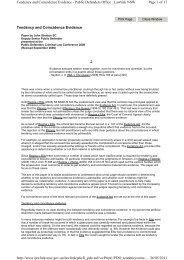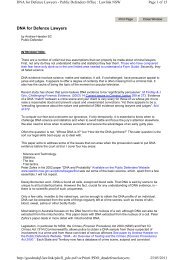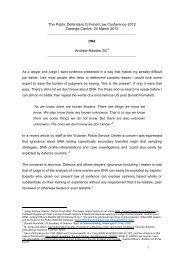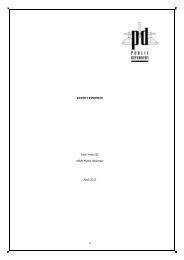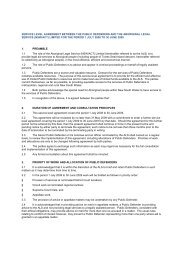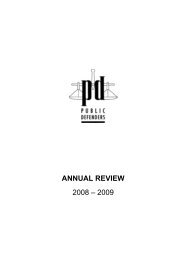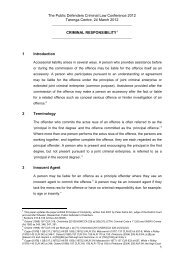Right to Silence: inferences from silence - The Public Defenders
Right to Silence: inferences from silence - The Public Defenders
Right to Silence: inferences from silence - The Public Defenders
Create successful ePaper yourself
Turn your PDF publications into a flip-book with our unique Google optimized e-Paper software.
Sections 34-38 Criminal Justice and <strong>Public</strong> Order Act 1994<br />
This right has been substantially eroded by sections 34 <strong>to</strong> 38 CJPOA 1994, which specify<br />
the circumstances in which adverse <strong>inferences</strong> may be drawn <strong>from</strong> the exercise of the<br />
primary right.<br />
<strong>The</strong> court is under an obligation <strong>to</strong> ensure that the jury are properly directed<br />
regarding the <strong>inferences</strong> which can be drawn (Condron v UK (2001) 31 EHRR 1).<br />
This puts an emphasis on Judges in jury trials <strong>to</strong> give an appropriate direction in the final<br />
summing-up – which has lead <strong>to</strong> a practice developing whereby the trial Judge will ask<br />
Prosecution and Defence advocates for their input on how <strong>to</strong> sum up the inference point.<br />
In Condron v UK, the European Court of Human <strong>Right</strong>s accepted that the right <strong>to</strong> <strong>silence</strong><br />
could not of itself prevent the accused’s <strong>silence</strong>, in cases which clearly call for an<br />
explanation by him, being taken in<strong>to</strong> account in assessing the persuasiveness of the<br />
prosecution evidence, but also stressed that a fair procedure (under Article 6) required<br />
‘particular caution’ on the part of a domestic court before invoking the accused’s <strong>silence</strong><br />
against him.<br />
3. Financial investigations<br />
In the case of financial investigations there are specific statu<strong>to</strong>ry safeguards which relate <strong>to</strong><br />
compulsory interviews.<br />
For example, a person who refuses <strong>to</strong> answer the questions of investiga<strong>to</strong>rs examining<br />
various commercial or financial activities can incurs a penalty. In Saunders v UK (1996) 23<br />
EHRR 313, the European Court of Human <strong>Right</strong>s held that the right <strong>to</strong> a fair trial was<br />
contravened where evidence obtained by these methods was used at trial.<br />
Section 59 of the YJCEA 1999, s. 59 and sch. 3, respond <strong>to</strong> the decision in Saunders v UK<br />
by restricting the use which can be made of evidence obtained under compulsion under a<br />
variety of statu<strong>to</strong>ry provisions including section 434 of the Companies Act 1985.<br />
<strong>The</strong> powers of investigation themselves are not affected: only the use of evidence obtained<br />
under them. <strong>The</strong> effect of the amendments <strong>to</strong> section 434 CA 1985 and other similar<br />
statu<strong>to</strong>ry powers is that, in criminal proceedings, the prosecution will not be able <strong>to</strong> adduce<br />
evidence, or put questions, about the accused’s answers <strong>to</strong> inspec<strong>to</strong>rs conducting an<br />
investigation using their powers of compulsion unless the evidence is first adduced, or a<br />
question asked, by or on behalf of the accused in the proceedings<br />
4. European Convention of Human <strong>Right</strong>s<br />
<strong>The</strong> ECHR recognises a right <strong>to</strong> remain silent during police questioning.<br />
In John Murray v UK (1996) 22 EHRR 29, the European Court held (at [20]):<br />
“ … although not specifically mentioned in Article 6 of the Convention, there can<br />
be no doubt that the right <strong>to</strong> remain silent under police questioning and the<br />
privilege against self-incrimination are generally recognised international<br />
standards which lie at the heart of the notion of a fair procedure under Article 6.”<br />
That does not mean that adverse inference cannot be drawn <strong>from</strong> <strong>silence</strong>.<br />
Colin Wells July 2013 Page 2



